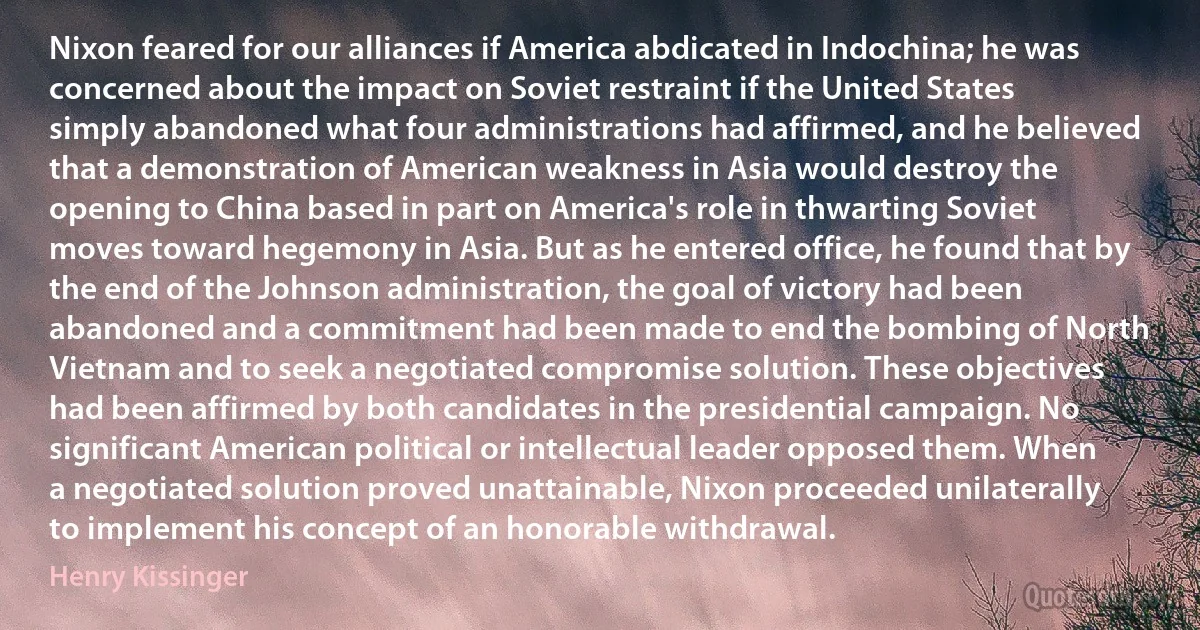
Nixon feared for our alliances if America abdicated in Indochina; he was concerned about the impact on Soviet restraint if the United States simply abandoned what four administrations had affirmed, and he believed that a demonstration of American weakness in Asia would destroy the opening to China based in part on America's role in thwarting Soviet moves toward hegemony in Asia. But as he entered office, he found that by the end of the Johnson administration, the goal of victory had been abandoned and a commitment had been made to end the bombing of North Vietnam and to seek a negotiated compromise solution. These objectives had been affirmed by both candidates in the presidential campaign. No significant American political or intellectual leader opposed them. When a negotiated solution proved unattainable, Nixon proceeded unilaterally to implement his concept of an honorable withdrawal.
Henry KissingerRelated topics
administration affirmed campaign compromise concept end found four hegemony honorable implement intellectual leader north office seek significant thwarting victory weakness withdrawal asia bombing johnson nixon indochina moves states unattainableRelated quotes
Decidedly, we are at cross-purposes. What's all this you tell [from England] about the modern movement, commercialism, etc, etc? It bears no relation to our concept of art, at any rate here... That is where the error lies. Trade serves those up to us as readily as anything else; so it is no use. Wouldn't it be better to steep ourselves in genuine nature again? I do not consider in the least that we are making a mistake, that we should turn to the steam-engine and follow the general public [ William Morris, the more traditional artist became very popular those days]... No, a thousand times no! We are here to point the way.... the remedy is to be found in nature, more than ever. Let us follow what we consider to be the proper aim, we shall see who is right. After all, money is a fragile thing; let us earn some of it, since we must, but let us keep to our role.

Camille Pissarro
When one looks at Ayatollah Khomeini's vision of an Islamic Government, one realizes that it actually had little to do with the traditional thinking of the Shi'ite establishment. I say this in the sense that his concept of the "Velayate Faghih” (Guardianship of the Islamic Jurists) has in effect violated at least two of the most cardinal principles of the Shi'ite faith. The first being that, the only time divine rule could be envisaged to have domain over us on Earth is upon the reappearance of the 12th Imam, who is considered a "Ma'soum” (or non-sinner). Until then, it is not the role of the clerics to govern society in the name of religion. The second being the principle of "Takassore Maraje'”, or the plurality of sources of emulation, in other words multiple high ranking clerical leaders, as opposed to a single source such as the Pope in Catholicism.

Reza Pahlavi
He loved his profession, he had a real sense of dedication to the administration of justice, he held his head high as a lawyer, he rendered and exacted courtesy, honor and straightforwardness at the Bar. He respected the judicial office deeply, demanded the highest standards of competence and disinterestedness and dignity, despised all political use of or trifling with judicial power, and had an affectionate regard for every man who filled the exacting prescription of the just judge. The law to him was like a religion, and its practice was more than a means of support; it was a mission. He was not always popular in his community, but he was respected. Unpopular minorities and individuals often found in him their only mediator and advocate. He was too independent to court the populace - he thought of himself as a leader and lawgiver, not a mouthpiece.

Robert H. Jackson
I know that there are those that are saying to the individuals who are involved in the freedom struggle, slow up for a while; you're pushing things too fast. Or they may say, adopt a policy of moderation. Well, if moderation means moving on toward the goal of justice, with wise restraint and calm reasonableness, then moderation is a great virtue, which all men of good will must seek to achieve during this tense period of transition. But if moderation means slowing up in the move for freedom, capitulating to the undemocratic practices of the guardians of a deadening status quo, then moderation is a tragic vice which all men of good will must condemn. The fact is, we can't afford to slow up. We have our self-respect to maintain, but even more than that, because of our love for democracy and because of our love for America, we can't afford to slow up.

Martin Luther King Jr.
On May 19, 2009, I was taken to the White House to meet President Obama. We'd met once before when he'd visited the Pentagon during his first week in office, but as DJS I'd been in a collection of other civilian and military leaders, so it was unlikely he remembered the man who would soon command his military effort in Afghanistan. I'd been in the Oval Office before with President George W. Bush, but the atmosphere in the West Wing in the final and opening months of administrations differed perceptibly. Although it was four months into Obama's term, there was still a feeling of newness to the people, who moved with an air of excited purpose through the hallways. When the president was available, the door opened and Obama walked to the entrance to greet me into the room. The meeting was short, but cordial. The president offered no specific guidance but locked his eyes with mine and thanked me for accepting the responsibility.

Stanley A. McChrystal
